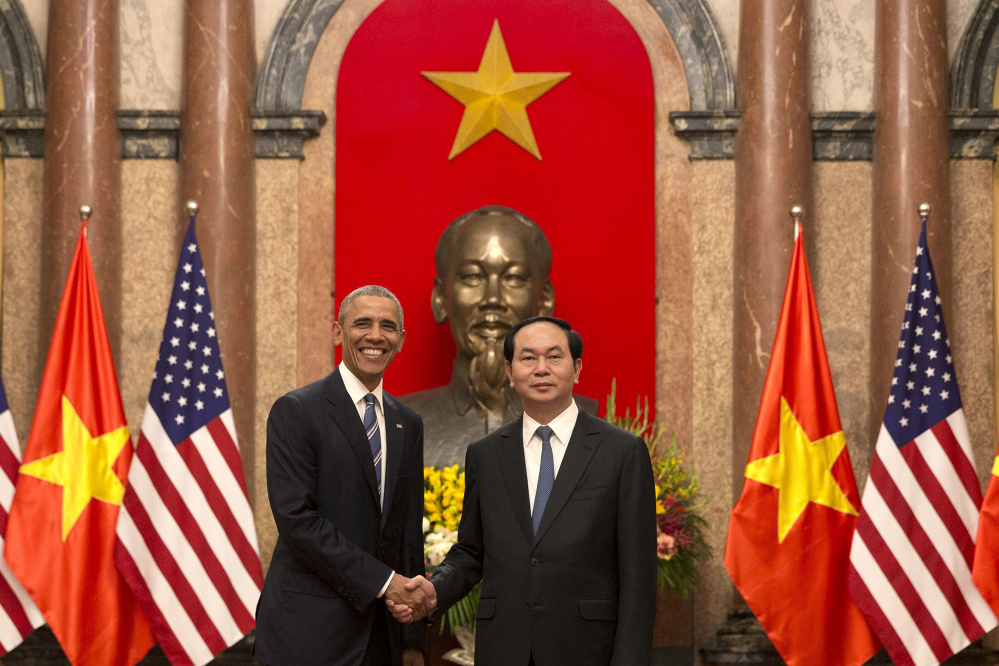HANOI, Vietnam — If President Obama’s decision to sell arms to Vietnam after 40 years was meant to signal a final end to Cold War tensions, it also inserted the United States more forcefully into a new Asian dispute.
Analysts said it served as a warning to China, which has been angering neighbors such as Vietnam with aggressive moves around the South China Sea, the vital shipping lanes that serve as the lifeline of the region.
“This is really a warning shot fired across the bow of China’s forward maritime policy,” said Orville Schell, director of the Center on U.S.-China relations at the Asia Society.
“It … provides Vietnam a hedge against China’s increased assertiveness in the South China Sea,” said Murray Hiebert, deputy director and senior fellow of the Southeast Asia Program at the Center for Strategic and International Studies.
China’s reaction was cool.
“As a neighbor to Vietnam, China is happy to see Vietnam develop normal relations with all countries, including the U.S. And we hope this would be conducive to regional peace, stability and development,” said Chinese Foreign Ministry spokeswoman Hua Chunying.
Vietnam has not given the United States a specific wish list, but experts say Hanoi could be looking for warships, missiles and radar, surveillance and communications equipment. For example, Lockheed’s P-3 Orion and C-130 Hercules, or Boeing’s P-8 Poseidon could help track Chinese ships and submarines.
Vietnam’s current main source of weapons is Russia, which has provided Kilo-class submarines and Sukhoi fighter jets, and would likely remain a cheaper and more efficient supplier.
Obama said at a news conference with Vietnamese President Tran Dai Quang that the decision was not about China, but rather one “based on our desire to complete what has been a lengthy process toward moving toward normalization with Vietnam.”
“This change will ensure that Vietnam has access to the equipment it needs to defend itself and removes a lingering vestige of the Cold War,” he said. “It also underscores the commitment of the United States to a fully normalized relationship with Vietnam, including strong defense ties with Vietnam and this region for the long term.”
The U.S. has not sold lethal weapons to Vietnam since communists took control of the entire country at the end of the Vietnam War, which left nearly 60,000 Americans dead. President Ronald Reagan officially prohibited arms sales in 1984.
“Vietnam very much appreciates the U.S. decision to completely lift the ban on lethal weapon sales to Vietnam, which is clear proof that both countries have completely normalized the relations,” Quang said.
In a word of caution, however, Quang said later at a luncheon that “the wounds of the war have not been fully healed in both countries.”
Moreover, many analysts in the U.S. and elsewhere remain alarmed about human rights abuses in Vietnam, and fear that Obama gave away important leverage on that front by allowing weapons sales.
“President Obama has rewarded Vietnam even though they have done little to earn it: The government has not repealed any repressive laws, nor released any significant number of political prisoners, nor made any substantial pledges,” said John Sifton, Asia policy director of Human Rights Watch.
Sifton called on the U.S. government to use the regulatory framework and licensing regime for future sales and transfers to create incentives for Vietnam to improve its human rights record.
Obama can lift the arms embargo to Vietnam without congressional approval. But lawmakers will need to sign off on individual sales.
He had removed a piece of the ban in late 2014, allowing the sale of equipment for “maritime security purposes.” But, according to Capitol Hill staffers and experts, Vietnam has not made any major weapons purchases since 2014.
Several Vietnamese groups and U.S. lawmakers had pushed Obama to completely lift the weapons ban because of China’s actions.
“They sunk a Vietnamese vessel a couple years ago. There is a history, a 2,000-year history, of occupation of Vietnam,” Sen. John McCain, R-Ariz., a Vietnam War veteran and former prisoner of war, said in an interview before the decision was announced. “I believe that Chinese behavior warrants us assisting them in obtaining the ability to defend their rights as a nation.”
Vietnam has criticized China for threatening its fishing boats, engaging in exploratory drilling and embarking on a massive land-reclamation program, all in the South China Sea.
Arms sales to Vietnam would come after a gradual increase in U.S. interaction and aid to Vietnam over the years. In 2013, the U.S. announced it would provide $18 million to Vietnam to help buy coast guard patrol vessels for the South China Sea. More recently, Congress authorized $450 million over five years to provide equipment, supplies and training to South East Asian nations, including Vietnam, to deal with maritime sovereignty issues.
Send questions/comments to the editors.


